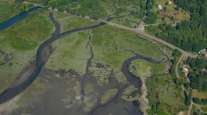Staff Reporter
Funds Top $1 Billion for Appalachian, Tribal Transportation

[Stay on top of transportation news: Get TTNews in your inbox.]
Travel along highways and other transportation systems in 11 Appalachian states and tribal areas is expected to become easier due to a $1.3 billion infusion of funds from the U.S. Department of Transportation.
The funding announcements were made by the DOT and the Federal Highway Administration.
The largest influx, $1.2 billion, will be allocated over five years to the Appalachian Development Highway System through President Joe Biden’s Bipartisan Infrastructure Law to help complete a 3,000-mile network connecting 13 states from New York to northern Mississippi, DOT announced Jan. 25.
#ICYMI @USDOT announced more than $1.2 billion for the Appalachian Development Highway System! Annual funding for the #ADHS will increase 146% compared to 2021, providing economic growth & improved access to communities in 11 #Appalachian states. https://t.co/yP0Bg8Gm4B — Appalachian Regional Commission (@ARCgov) January 25, 2022
Currently much of the freight transported through the region travels long distances to destinations outside of Appalachia. Sometimes bypassed due to its rugged terrain, the Appalachian region traditionally has been underserved by the interstate highway system, according to DOT.
“From big cities to small towns, every American community deserves reliable access to our transportation system,” said U.S. Transportation Secretary Pete Buttigieg during the announcement.
The ADHS includes 33 regional corridors that serve as important national transportation links — connecting Appalachian states to interstates and providing key access to regional and national markets. Constructing the ADHS has increased regional economic activity and saved 231 million hours of travel time annually, benefiting commuters and truckers.
A July 2017 study by the Appalachian Regional Commission found that “31% of freight truck vehicle hours saved accrue to trips with at least one end located outside the 13 Appalachian states,” showing the ADHS’ importance in “serving longer‐distance goods movement and trade.”
Designated for ADHS funds
• Alabama — $73.8 million,• West Virginia — $37.3 million,
• Virginia — $19.9 million
• Ohio — $18.5 million,
• Pennsylvania — $17 million,
• North Carolina — $16.1 million,
• Tennessee — $14.7 million,
• Georgia — $13.6 million
• Kentucky — $13.5 million,
• Maryland — $11 million, and
• Mississippi — $10.2 million.
The study, “Economic Analysis of Completing the Appalachian Development Highway System: Technical Report,” forecast that completion by 2045 of the ADHS would result in “travel time and reliability gains for the U.S., leading to over $1.8 billion in annual transportation efficiency, safety and environmental cost savings.”
As of 2015, drivers along the ADHS saved 360 million hours annually in travel time compared to how long it would have taken without highway improvements, the report noted.
States will receive funds ranging from $10 million to $73 million this fiscal year, with Alabama and West Virginia receiving the most.
Finishing the ADHS will create 47,000 jobs and add $8.7 billion in goods and services annually across the Appalachian states, according to DOT.
ADHS 2021 Cost to Complete Estimate Report March 2021 by Transport Topics on Scribd
Meanwhile, the federal government will provide up to $17.8 million over five years to re-establish seven Tribal Technical Assistance Program Centers across the nation, FHWA said on Jan. 24.
“Ensuring rural regions are connected to the rest of America’s cities and towns is key to our nation’s economic success,” said Deputy Federal Highway Administrator Stephanie Pollack.
This investment is expected to take the ADHS from today’s 85% completion to 100% by 2040 and completely open it to traffic.
Total fiscal 2022 funds for the ADHS will be $246 million (up 146% from the previous year).
The centers expired in 2017 when FHWA began an experiment with a single, national TTAP Center, the agency said. However, the centers are being restarted to better meet local needs by serving 12 Bureau of Indian Affairs’ regions and associated tribes.
“Re-establishing regional TTAP Centers will help tribal governments increase their ability to plan, develop, deliver and manage transportation programs, projects and critical infrastructure,” Pollack said.
The availability of federal funds to restart the centers was announced through a published Notice of Funding Opportunity.
Want more news? Listen to today's daily briefing below or go here for more info:




